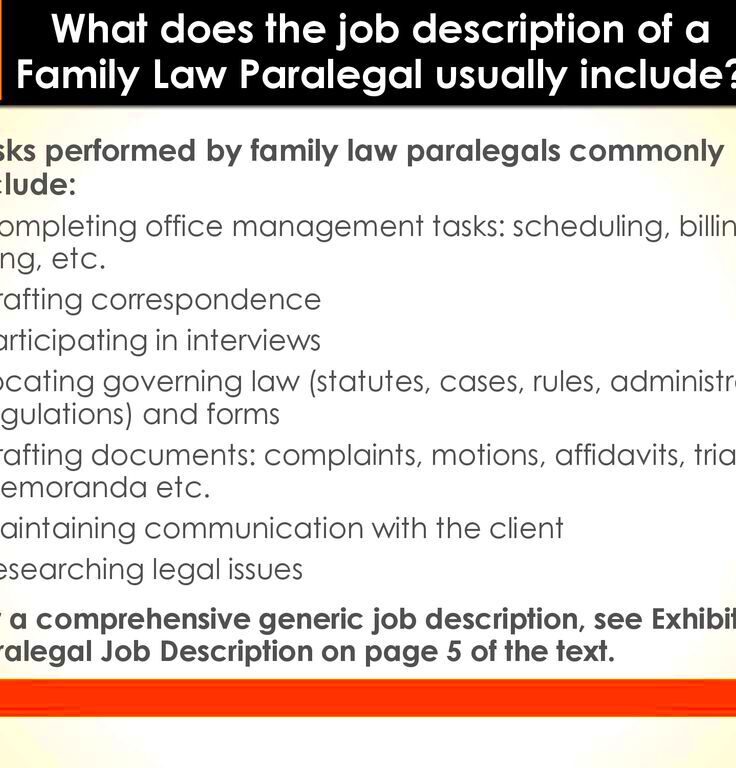Family Law Paralegal Duties and Responsibilities
Family law paralegals play a crucial role in assisting attorneys and clients in navigating the complexities of family law matters. They provide vital support in various tasks, ensuring that legal processes run smoothly. From handling documentation to communicating with clients, their contributions help create a more efficient legal environment. With a focus on family-related issues such as divorce, child custody, and adoption, paralegals in this field need a unique skill set to address the emotional and legal challenges faced by clients.
Key Duties of Family Law Paralegals

Family law paralegals have a wide range of responsibilities that are essential for the success of a case. Here are some of their key duties:
- Assisting with Case Preparation: Paralegals help gather necessary documents and evidence to build a strong case.
- Client Interviews: They conduct initial interviews with clients to understand their situations and gather relevant information.
- Filing Legal Documents: Paralegals are responsible for preparing and filing various legal documents with the court.
- Researching Case Law: They perform legal research to find precedents and laws that apply to specific cases.
- Scheduling Appointments: Paralegals manage calendars and schedule meetings with clients, witnesses, and experts.
Understanding Legal Research and Documentation
Legal research and documentation are core components of a family law paralegal’s role. This involves searching for laws, regulations, and case law that pertain to family law matters. Here’s a closer look at these tasks:
Legal research can involve:
- Case Law Analysis: Identifying relevant cases that support a client’s position.
- Statutory Research: Looking up specific laws that apply to family law issues, like custody and support.
- Secondary Sources: Using legal textbooks, articles, and other resources to gain a deeper understanding of family law.
Documentation is equally important. Paralegals must ensure that all legal documents are correctly formatted and submitted on time. This includes:
- Petitions: Preparing petitions for divorce, custody, and other family law issues.
- Affidavits: Drafting affidavits that support a client’s case.
- Correspondence: Writing letters to clients, courts, and opposing counsel.
By mastering these skills, family law paralegals not only support their attorneys but also help clients feel more at ease during challenging times.
Assisting with Client Communication
Effective communication is vital in family law, where emotions often run high. Family law paralegals play an essential role in facilitating communication between clients and attorneys. They ensure that clients understand the legal processes they are going through and keep them informed about the progress of their cases.
Here’s how paralegals assist with client communication:
- Initial Client Contact: Paralegals often handle the first interactions with clients, making them feel welcome and providing necessary information.
- Gathering Information: They ask relevant questions to gather details that can help build the case, ensuring no important information is missed.
- Regular Updates: Paralegals keep clients informed about case developments, changes, and upcoming deadlines, which helps reduce anxiety.
- Clarifying Legal Terms: They explain complex legal jargon in simple terms, making it easier for clients to understand their rights and options.
By maintaining clear and open lines of communication, family law paralegals ensure that clients feel supported and informed throughout their legal journey.
Managing Case Files and Records
Organizing and managing case files is a critical responsibility of family law paralegals. They must maintain accurate and up-to-date records to ensure that nothing slips through the cracks. Here’s what this entails:
- Organizing Files: Paralegals create and maintain physical and digital files for each case, organizing them in a way that makes it easy to access important documents.
- Tracking Deadlines: They use calendars and task management tools to keep track of important deadlines, ensuring timely submissions of documents and filings.
- Maintaining Confidentiality: Paralegals handle sensitive information and must follow strict guidelines to protect client confidentiality.
- Document Retrieval: They are responsible for retrieving necessary documents when needed, whether from court records or other sources.
Effective file management helps ensure that the legal team has all the information needed to represent the client successfully and keeps the case moving forward smoothly.
Preparing Legal Documents
One of the core duties of family law paralegals is preparing legal documents. These documents are essential for court proceedings and must be accurate and properly formatted. Here are the main types of documents they prepare:
- Pleadings: Paralegals draft legal pleadings such as complaints, answers, and motions, which initiate or respond to legal actions.
- Discovery Documents: They prepare requests for information, interrogatories, and subpoenas that are necessary for gathering evidence.
- Settlement Agreements: Paralegals help draft settlement agreements that outline the terms agreed upon by both parties, especially in divorce or custody cases.
- Court Filings: They ensure that all necessary documents are filed with the court in a timely manner, adhering to specific court rules and procedures.
By paying close attention to detail and following proper procedures, family law paralegals help ensure that legal documents are prepared correctly, which is crucial for the success of any case.
Collaboration with Attorneys and Clients
Collaboration is at the heart of effective family law practice. Family law paralegals work closely with both attorneys and clients to ensure that everyone is on the same page. This teamwork is essential for building strong cases and achieving the best possible outcomes.
Here are some ways in which paralegals foster collaboration:
- Team Meetings: Paralegals often participate in team meetings with attorneys to discuss case strategies, share updates, and outline next steps.
- Client Coordination: They act as the main point of contact for clients, relaying information from attorneys and helping clients prepare for meetings.
- Document Sharing: Paralegals ensure that all relevant documents are shared with both clients and attorneys, streamlining the information flow.
- Feedback Gathering: They collect feedback from clients about their experiences and concerns, which can help attorneys tailor their strategies accordingly.
By maintaining open communication and fostering teamwork, family law paralegals contribute to a collaborative atmosphere that ultimately benefits the clients they serve.
Ethical Considerations in Family Law
Working in family law comes with significant ethical responsibilities. Family law paralegals must adhere to strict ethical standards to protect clients and the integrity of the legal system. Here are some key ethical considerations:
- Confidentiality: Paralegals must safeguard all client information. Breaching confidentiality can have serious legal consequences and harm the client’s case.
- Competence: It’s essential for paralegals to understand the laws and procedures relevant to family law to provide accurate information and support.
- Conflict of Interest: Paralegals should avoid situations where personal interests might conflict with professional duties. Transparency with clients is crucial.
- Respect for the Law: Upholding the law and maintaining professionalism is essential. Paralegals should never engage in unethical practices.
By being aware of and adhering to these ethical considerations, family law paralegals can build trust with clients and contribute to a fair legal process.
FAQ about Family Law Paralegal Roles
Many people have questions about what family law paralegals do and how they fit into the legal landscape. Here are some frequently asked questions:
- What qualifications do family law paralegals need? Typically, paralegals should have a degree or certificate in paralegal studies, along with knowledge of family law.
- Can paralegals represent clients in court? No, paralegals cannot represent clients in court or provide legal advice. They assist attorneys in preparing for cases.
- What is the difference between a paralegal and a legal assistant? While the terms are often used interchangeably, a paralegal usually has more specialized training and responsibilities.
- How can a paralegal help with a divorce? Paralegals assist with document preparation, case management, and client communication throughout the divorce process.
These FAQs help clarify the important role family law paralegals play and highlight their contributions to the legal system.
Conclusion on Family Law Paralegal Duties
Family law paralegals are indispensable to the legal field, particularly in family law cases where sensitive issues such as divorce, child custody, and adoption arise. Their diverse responsibilities, including assisting with client communication, managing case files, and preparing legal documents, ensure that attorneys can focus on providing effective legal representation. By fostering collaboration between clients and attorneys, adhering to ethical standards, and staying organized, family law paralegals contribute significantly to the smooth operation of legal processes. Their role not only enhances the efficiency of law firms but also provides vital support to clients during challenging times, making them a key part of the family law landscape.


